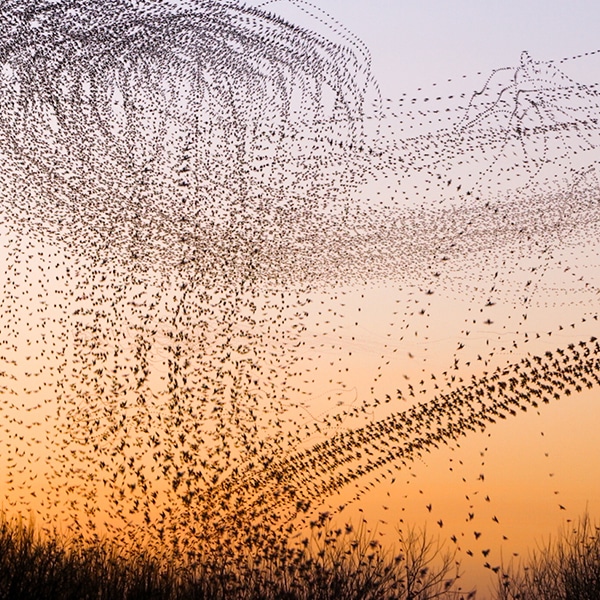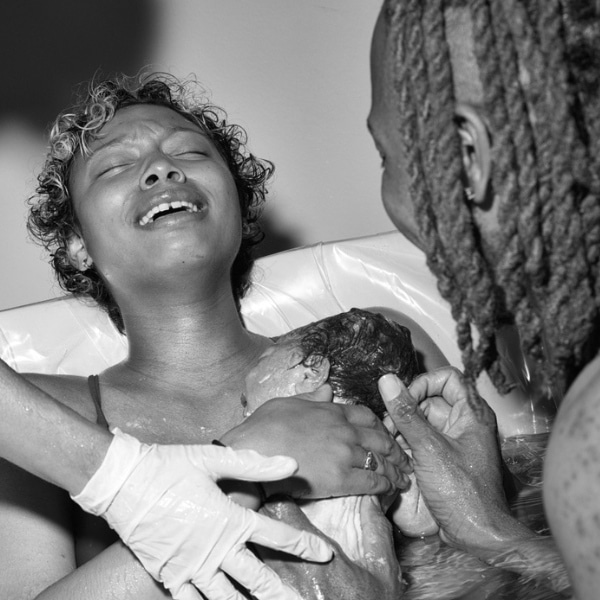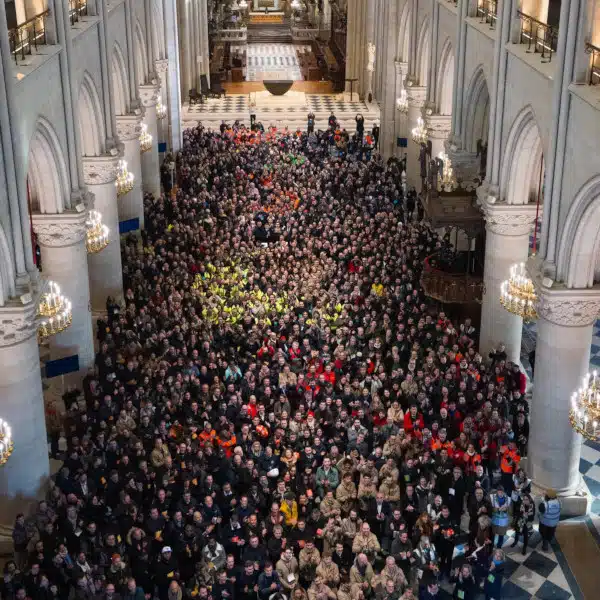
What began as an homage to Brandon Stanton's Humans of New York has turned into a powerful photo project that sheds much-needed light on the often ignored lives of homeless people in Montreal. Parisian-born photographer Mikal Theimer started Humans of the Street as a subproject of Portraits of Montreal, which focuses on local people and their stories. But after he posted a portrait of a homeless man who was “afraid the summer heat waves would kill him, because he has asthma,” Theimer quickly realized the impact he could have when one of his readers shared a photo of herself giving the homeless man a box of inhalers.
Since then, Humans of the Street has grown into an incredible project that aims not only to connect the viewer with the subject, but also to make real changes in the lives of the homeless individuals. Theimer captures striking, black-and-white portraits of each subject, accompanied by more details like a quote or a story that shows how each person has gotten to where he or she is today, whether they struggle with an addiction, had an abusive childhood, or were simply struck by sudden misfortune that flipped their lives upside-down. Theimer has also started including details about where to find the subjects as well as what urgent needs they may have, in case any readers feel compelled to supply them with food, shelter, or medicine.
Even more than helping these homeless people get access to material needs, Theimer's portraits are so impactful because they humanize the subjects by portraying them as individuals instead of nameless figures that can be dismissed as another anonymous part of the homeless population. “This is very important to us,” the photographer tells Mic. “This is the big reason why we're doing this: We want to make the first step between everyday people and homeless people, we want to break the ice, make them feel like friends. Because then how can we stand to leave our friends in such a living hell?”
The next time you feel tempted to hurry past the man on the street corner or the woman asking for spare change, Theimer invites you to instead smile and say hello–you never know what a difference these small gestures can make, both to you and to the recipient. “Friends support each other, and if homeless people felt supported by common citizens, they'd be more likely to fight with everything they have to get their life back in order,” he says. “And they'd have help along the way, our help.”
Above: Jeff

 Fred & Mika (& Claudette)
Fred & Mika (& Claudette)
“She had my dog vaccinated, and tomorrow she's taking her to get neutered.”
“What got you to help them?”
“First I saw that he's not a junkie, and that he's not a drunk. He's young, his dog is his life, and it's hard to find a place to stay in the winter with a dog. And it always comes from our families, from our parents: when we're mistreated we pay the consequences, and when we're spoiled… My mother was an orphan, she was a designer and she made a lot of money. There were orphanages at the time, and on every occasion, my mother would help. When she was asking her clients for stuff to donate, she'd say, ‘Don't give me rags, that's what they have.' So you know, it goes back a long way. Young, young, young, I learned that when you see a smile on a face, whether it's a child's or an adult's, it stays with you.”
 Ludovic
Ludovic
“I was suicidal until the age of 18. I did about 20 suicide attempts, and one day I realized life was too beautiful, that I had to stop pressuring myself thinking about all the war and the famine going on in the world because I am powerless against this.”
“What made you want to kill yourself?”
“The fact that the world can't realize that we are not the masters of the world, it's the Earth that's the master of us, we need to stop destroying it. All the famine in the world. Seeing that a guy driving around with a $200,000 car could feed almost all of Mozambique or Burkina Faso just with his car. Seeing the rich insisting to get richer at the expense of the poor. This is something that will always affect me. I came into this world with huge existential anxiety related to all the violence happening in the world, to the lack of respect people have towards themselves and towards others. My wealth in life is the smiles I encounter, the help I'm able to provide, the help I receive, the people that reach out to me. When I was 13, I was in the street, after my first detox. At 12, I was selling mescaline. I stopped because I was selling it to adults, those adults were selling it back to my mom, and my mom was on another planet. At 8, I already had a lawyer, because I had been abused and mistreated my whole youth. Because of this I left home at 13. But it forged everything I am, and I am proud of what I am today. I'm proud of what I've accomplished, I'm proud to see that other people also think I'm a good person, a nice little fellow that gives smiles. I have to help the people around me: if someone next to me is cold, my shirt becomes twice as valuable because I can use it to warm two people. Nowadays, I listen to my heart. If my heart tells me to do something, even if my head tells me not to, I do it. If your heart tells you to do something, do it, because you're going to get an extremely enriching experience out of it.”
 Michel
Michel
 Gilles & Fernand
Gilles & Fernand
“We've known each other for over twenty years. Plenty of people find themselves a partner in the street, but they are not like him and I. I can guarantee, on the life of anyone, I've never seen two homeless persons stick together like us. He does his part, and I do mine. That's how it works, you have to help each other.”
 Eva & Elizabeth
Eva & Elizabeth
 “I lost everything because of cancer. I used to make $5,000 per week with my company but I couldn't work anymore and it dropped to $900 a month with social welfare. So my girlfriend abandoned me, she left with her daughters. They weren't mine but I'd been raising them for the past 15 years. The youngest was six months old when I entered the family! Today, only the oldest one agrees to see me. But all of this is temporary, I know I'm going to get back to work, I've only gotten better since Christmas.”
“I lost everything because of cancer. I used to make $5,000 per week with my company but I couldn't work anymore and it dropped to $900 a month with social welfare. So my girlfriend abandoned me, she left with her daughters. They weren't mine but I'd been raising them for the past 15 years. The youngest was six months old when I entered the family! Today, only the oldest one agrees to see me. But all of this is temporary, I know I'm going to get back to work, I've only gotten better since Christmas.”
 Jean-Louis
Jean-Louis
“I don't want you to take a picture with my face on it because I've got an 11 year old daughter and I'd rather tell her face to face what happened to me, rather than have her find out on the Internet.”
 David & Diamond
David & Diamond
Theimer: I saw him from across the street, sitting on the steps of a Sainte-Catherine store, with his head down on his knees and his hand out, balancing back and forth repeatedly. We though he wasn't well, and weren't sure whether to approach him or not. I went up to him anyway, crouched down, and asked “Hey man, are you ok?” He instantly lift his head up, smiled and casually replied: “Hi! Yes I am, I was just praying for things to get better. I was a heroin addict for 30 years and prayed that God help me stop, and he did five years ago. Now I have no desire for it anymore, I don't even like to stay with the people that use anymore. I'm praying that he helps me stay this way.”
 “I've been without revenue, without social assistance, nothing, for 30 months. It was long. They evicted me from my apartment, so I lived in the streets between November 2001 and January 2002. It wasn't warm. It wasn't warm. I've been receiving social assistance since August 2003, so I can pay for my rent and for my clothes. It's somewhat less difficult. I've got a place to eat, a place to sleep, a place to wash. That's the hardest part, when you don't have place to stay, you can't wash. Even if you have money, you can eat, but you can't wash. Today my biggest struggle is to stay alive. Pretty much the only struggle I have.”
“I've been without revenue, without social assistance, nothing, for 30 months. It was long. They evicted me from my apartment, so I lived in the streets between November 2001 and January 2002. It wasn't warm. It wasn't warm. I've been receiving social assistance since August 2003, so I can pay for my rent and for my clothes. It's somewhat less difficult. I've got a place to eat, a place to sleep, a place to wash. That's the hardest part, when you don't have place to stay, you can't wash. Even if you have money, you can eat, but you can't wash. Today my biggest struggle is to stay alive. Pretty much the only struggle I have.”
Humans of the Street on Tumblr
Portraits of Montreal on Facebook
Mikal Theimer's website
via [A+], [Mic]
























































































